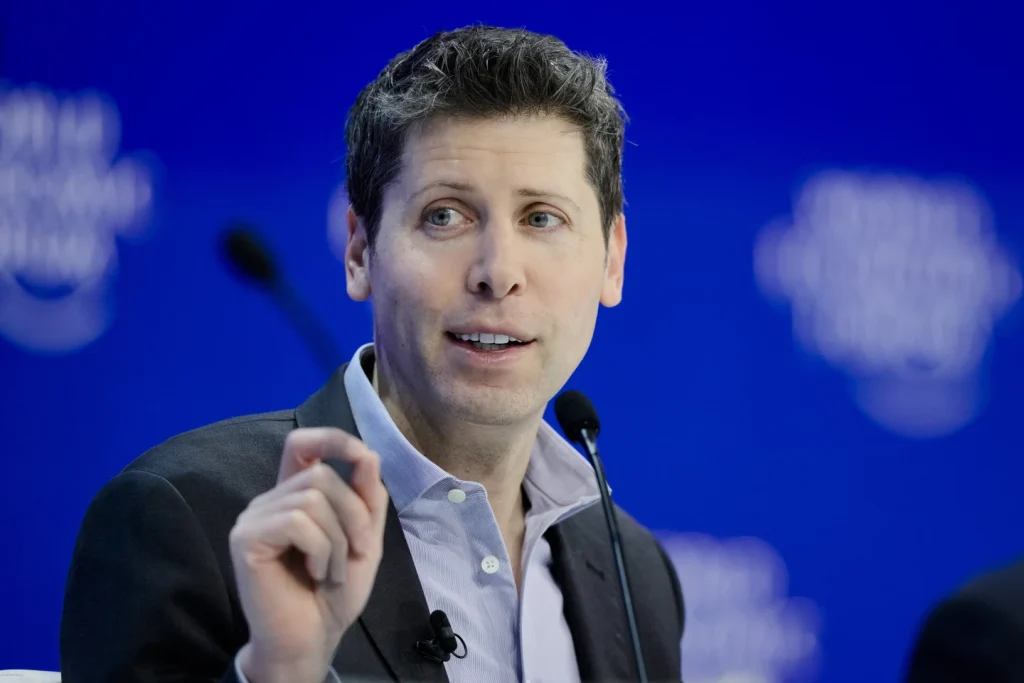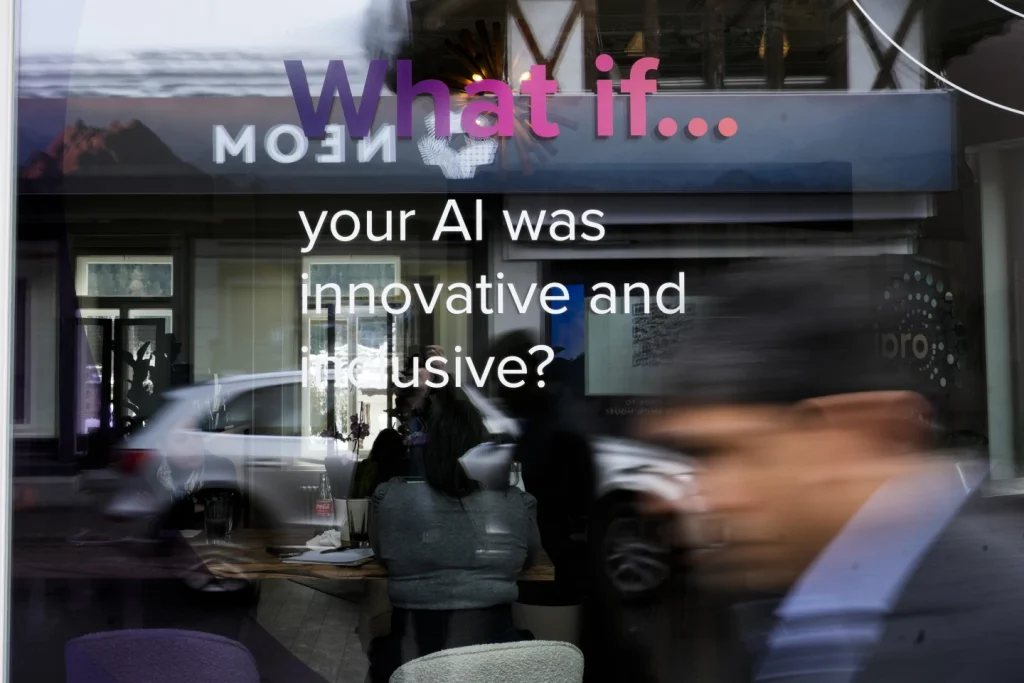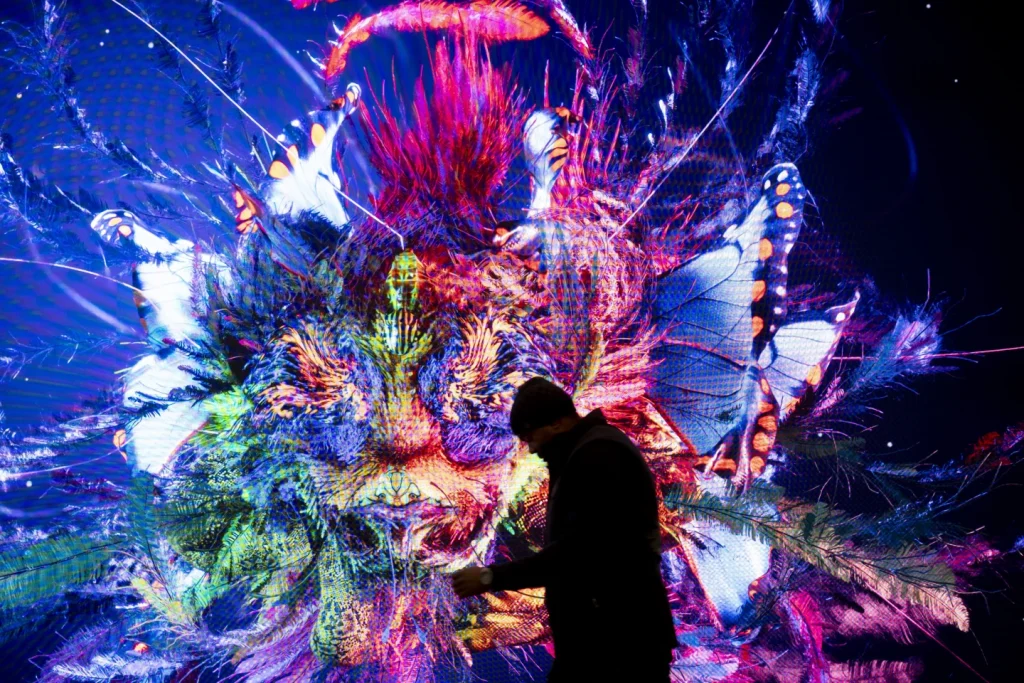The World Economic Forum’s annual meeting in Davos, Switzerland, has always been a hotbed for discussions on cutting-edge technologies and their impact on the world.
In recent years, no other concept has captured the attention of world leaders and corporate titans quite like artificial intelligence (AI).
The breathtaking advances in generative AI have left the world in awe, and the elite crowd at Davos is eager to harness its potential while mitigating its risks.
The presence of OpenAI, the maker of ChatGPT, and its CEO Sam Altman at Davos speaks volumes about the soaring prominence of AI.
Altman’s debut at Davos, alongside Microsoft CEO Satya Nadella, drew attention from rock star crowds, underscoring the significance of AI in today’s global landscape.
The geopolitical implications of AI are undeniable, as evidenced by the discussions among world leaders from China to France.
The impact of AI permeated through the Swiss Alpine town and reverberated in afterparties, emphasizing its far-reaching influence.
The leadership turmoil at OpenAI, a prominent player in the AI domain, only added to the intrigue surrounding the company.
Altman’s sudden dismissal and subsequent reinstatement solidified his position as a key figure in the generative AI revolution.
However, lingering questions about the boardroom upheaval and OpenAI’s governance continue to cast a shadow.

Altman’s remarks at a Davos panel shed light on the challenges faced, acknowledging the need for a more robust and experienced board to navigate the complexities of AI development and deployment.
The fusion of powerful AI and human society has raised profound ethical and existential questions. Altman’s acknowledgment of the stress and responsibility associated with advancing powerful AI underscores the gravity of the situation.
As AI capabilities grow exponentially, the implications for humanity become increasingly profound, demanding a concerted effort to ensure responsible and ethical development.
In conclusion, AI has emerged as a defining force in global discourse, permeating through the corridors of power and shaping the future of humanity.
The discussions at Davos underscore the urgency of addressing the opportunities and challenges posed by AI, emphasizing the need for responsible stewardship of this transformative technology.
The convergence of AI and human society represents a pivotal moment in history, demanding thoughtful deliberation and decisive action to harness its potential for the betterment of humanity.
As we navigate the complexities of AI, it is imperative to uphold ethical principles and ensure that the development and deployment of AI align with the broader interests of society.
Only through a collaborative and responsible approach can we fully realize the promise of AI while safeguarding the well-being of humanity.
In the grand theater of global affairs, AI has taken center stage, and its impact will reverberate for generations to come.
It is incumbent upon us, as global citizens and leaders, to steer the course of AI development towards a future that is not only technologically advanced but also ethically sound and socially responsible.
World leaders are making their positions clear on the issue of artificial intelligence (AI) as the world grapples with how to regulate this rapidly developing technology.
From China to Europe, top officials have staked their positions on AI, recognizing the significant implications it has for workplaces, elections, and privacy.
The European Union has taken a significant step by devising the world’s first comprehensive AI rules ahead of a busy election year.
This move comes as AI-powered misinformation and disinformation pose the biggest risk to the global economy, threatening to erode democracy and polarize society, according to a recent World Economic Forum report. This highlights the urgency of the need for regulation in this area.
Chinese Premier Li Qiang has emphasized the need for human control over AI, referring to it as a “double-edged sword.”

He stressed the importance of guiding AI in a direction that is conducive to the progress of humanity and called for a red line in AI development that must not be crossed.
This indicates China’s recognition of the potential dangers of unchecked AI development and the need for international cooperation in governing AI.
China, being one of the world’s centers of AI development, has expressed its willingness to step up communication and cooperation with all parties to improve global AI governance.
While the country has released interim regulations for managing generative AI, the EU has broken ground with its AI Act, which has won a hard-fought political deal and is awaiting final sign-off.
This demonstrates the proactive approach taken by both China and the EU in addressing the regulatory challenges posed by AI.
European Commission President Ursula von der Leyen has highlighted the significant opportunity presented by AI if used in a responsible way.
She emphasized that the global race to develop and adopt AI is already underway and touted the EU’s efforts, including the AI Act and a program pairing supercomputers with small and midsized businesses to train large AI models.
This showcases the EU’s commitment to harnessing the potential of AI while ensuring responsible and ethical use.
French President Emmanuel Macron has also expressed his support for AI, emphasizing France’s role in coordinating regulation on deepfake images and videos created with AI.
He has also announced plans to host a follow-up summit on AI safety, further demonstrating the commitment of world leaders to address the challenges posed by AI.
The prominence of AI was evident at the Davos Promenade, where consulting firms and tech giants showcased their AI-related initiatives.
This reflects the growing importance of AI on the global stage and the need for concerted efforts to regulate and govern its development and use.

In conclusion, the positions staked by world leaders on AI reflect the recognition of the significant implications of this technology and the need for coordinated global efforts to regulate and govern its development and use.
The proactive steps taken by the EU and China, as well as the commitments made by individual leaders, signal a growing consensus on the importance of responsible and ethical AI development.
As AI continues to shape the future of technology and society, it is imperative for world leaders to work together to ensure that AI is harnessed for the benefit of humanity.
The main conference center buzzed with excitement as attendees marveled at the giant digital wall displaying mesmerizing images of AI art and computer-generated representations of wildlife and nature.
The allure of this cutting-edge technology was palpable, and those eager to delve deeper into the technical aspects of artificial intelligence found themselves drawn to the AI House, where sessions on the intricacies of AI were being conducted.
Generative AI systems such as ChatGPT and Google’s Bard have captured the world’s imagination by rapidly producing new poems, images, and computer code.
The potential of these systems to revolutionize various aspects of life and work is widely acknowledged. Satya Nadella, the CEO of Microsoft, expressed optimism about the transformative impact of AI, stating that it could invigorate the stagnant global economy.
Microsoft is actively integrating this technology into its products, reflecting the company’s belief in its potential to drive economic growth as a general-purpose technology.
Business leaders have also recognized the far-reaching implications of AI. While predicting that AI will streamline business functions and automate mundane tasks, they have also cautioned about the potential threat it poses to workers who may struggle to adapt to the changing landscape.
A survey of 4,700 CEOs in over 100 countries conducted by PricewaterhouseCoopers (PwC) revealed that 14% of them anticipate having to lay off staff due to the rise of generative AI.
Julie Sweet, CEO of consulting firm Accenture, emphasized that no industry will be left untouched by AI, underlining the pervasive impact it is expected to have.
The transformative potential of AI extends beyond the realm of work. It promises to revolutionize tasks such as computer coding and customer relations, making them more efficient and productive.
Arvind Krishna, the CEO of IBM, highlighted the advantages of embracing AI, emphasizing that those who fail to do so may find themselves at a disadvantage in the job market.
In addition to its impact on work and productivity, the discussion surrounding AI also delved into more controversial territory.
During a session featuring Meta’s chief AI scientist, Yann LeCun, the conversation turned to the topic of risks and regulation.
The moderator posed a hypothetical scenario involving “infinitely conversant sexbots” that could be created using open-source AI technology.
LeCun, taking a principled stance, emphasized the importance of ensuring that AI is not monopolized by a few tech giants, recognizing the need for a more inclusive and diverse approach that considers the values and cultures of people worldwide.
The potential of AI to revolutionize various aspects of life and work is undeniable. However, as with any technological advancement, it also raises important ethical and societal considerations.
The implications of widespread AI adoption on employment, privacy, and social dynamics must be carefully considered and addressed.
As we stand on the cusp of this technological revolution, it is imperative to approach the integration of AI with a balanced perspective that prioritizes both innovation and ethical responsibility.
In conclusion, the rise of generative AI systems has the potential to reshape the future of work and society.

While offering unprecedented opportunities for efficiency and productivity, it also presents challenges that must be navigated with care and foresight.
As we embrace the wave of the future, it is essential to ensure that the benefits of AI are harnessed in a manner that is inclusive, ethical, and conducive to the well-being of individuals and society at large.
